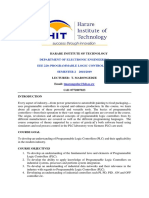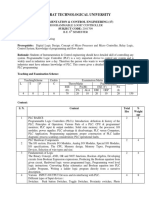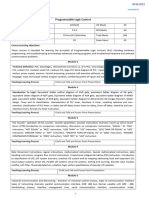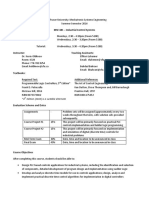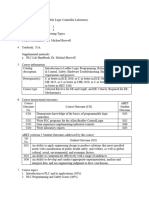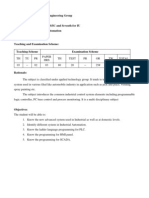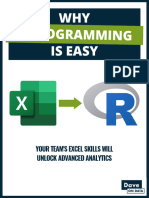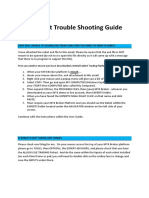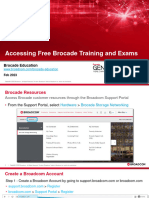MURANG’A UNIVERSITY OF TECHNOLOGY
SCHOOL OF ENGINEERING AND TECHNOLOGY
Bachelor of Technology in Electrical and Electronics Engineering
COURSE OUTLINE
Unit Code & Title: EET 415: Programmable Logic Controllers
Lecturer: Gordon Agutu
Phone Contacts: Tel: +254733712991 or +254727342682
Email Address: gagutu@gmail.com
Class Hours: Thursday 13.00 – 16.00
Consultation Hours: Thursday 15.30 – 18.30
Aim
To equip the learner with theoretical and practical skills for selection, installation and maintenance of logic controllers in Industrial
Control and measurements.
Contact Hours: 45 Hours
Prerequisite: EET 408
Course Learning Outcomes
At the end of this course you should be able to:
Describe the general architecture of PLCs
Explain the functions and applications of PLCs
Explain how PLCs are interfaced with other system hardware
Program PLCs using Ladder, Instruction Lists and Structured Text Methods
Install and configure PLCs
Indicative Content
Introduction to P.L.C. Need for PLC, types, advantages P.L.C systems, hardware configuration, ladder logic programming external
peripherals, p.l.c maintenance, Supervisory Control and Data Acquisition, (SCADA) definition, Human Machine Interface, Data
acquisition, sequential control, data storage and archiving, security, Industrial Communication network, networks and LANS, WANS
Industrial network topologies, industrial network protocols, physical network address network devices, Calibration Software types,
operation of calibration software, device connection to software; SCADA applications – Voting systems, railway control systems,
power control systems, industrial water and sewerage control systems.
Content
Week/Dates Topic
Introduction
Week 1 Course Outline
Recap: Control Systems, Microprocessors and Microcontrollers
PLC Block diagram, Internal architecture, example applications of PLCs, memory elements
Week 2&3 PLC Scan Sequence, I/O elements, program memory and data tables, PLC software
Ladder and Functional Block Diagrams
Week 4&5 Boolean statements/equations
Timers and Counters
Week 6&7 Logic diagram translations
SFC, and SFBs blocks
Week 8 Instruction Lists and Structured Text Programs
Use of HMI devices.
Page 1 of 3
�Week 9 PLC functions: combinational logic functions, timer and counting functions, initialization pulses, alarms and
interlocks, safety monitoring, trip and permissive systems, redundant or voting systems, bypass and points of
failure, specifications.
Week 10 Supervisory Control and Data Acquisition, (SCADA) definition, Human Machine Interface, Data acquisition,
sequential control, data storage and archiving, security,
PLC installation: manufacturers data, wiring requirements, safety principles, wiring redundant interlocks, I/O
wiring.
Week 11 Industrial automation (IA): IA systems, PLC programming of IA systems, program download, use of
programmable terminal (PT).
Industrial Communication network, networks and LANS, WANS Industrial network topologies, industrial
network protocols, physical network address network devices
Week 12 Calibration Software types, operation of calibration software, device connection to software; SCADA
applications – Voting systems, railway control systems, power control systems, industrial water and sewerage
control systems.
The S7 300 PLC: architecture, function of modules, hardware configuration, communication with ASI and bus
network topologies, use of MPI and Ethernet systems, use and applications
Summary and Tutorial
Course Delivery Methodology
Lectures: At least 2 hours per week of lectures will be used to introduce material on the formal aspects of the
unit
Tutorials: 1 hour per week
Laboratory Exercises: At least four sessions per semester each being 3 hours long
Students will research and present their findings on various topics
Discussions and working out problems
Academic Assessment
Examination: 70%
CATs: 15%, Assignments and lab exercises: 15%
Laboratory Exercises: Each student is expected to carry out at least four laboratory exercises.
Course Reference Materials
W. Bolton, Programmable Logic Controllers, Newnes, 5th Edition, 2005, ISBN-10: 1856177513, ISBN-13: 978-
1856177511
Elvin Pérez Adrover, Introduction to PLCs: A beginner's guide to Programmable Logic Controllers, Elvin Perez
Adrover, 2012, ISBN-10: 061565438X, ISBN-13: 978-0615654386
Orlando Charria, Fundamentals of Programmable Logic Controllers and Ladder Logic (Volume 1), Latin Tech Inc;
1st Edition, 2012, ISBN-10: 0615800076, ISBN-13: 978-0615800073
Frank Petruzella, Programmable Logic Controllers, McGraw-Hill Science/Engineering/Math; 4th Edition, 2010, ISBN-
10: 0073510882, ISBN-13: 978-0073510880.
Frank Petruzella, Activities Manual to accompany Programmable Logic Controllers, McGraw-Hill
Science/Engineering/Math; 4th Edition, 2010, ISBN-10: 0073303429, ISBN-13: 978-0073303420
Terry L.M. Bartelt, Industrial Automated Systems: Instrumentation and Motion Control, Cengage Learning; 1st
Edition, 2010, ISBN-10: 1435488881, ISBN-13: 978-1435488885
Classes
Punctuality is fundamental.
Active participation in class discussions is encouraged
Assignments and/or Course Work
Plagiarism is a serious offence. If detected in any form in course work and assignments, the following will apply:
In partial or non-serious cases (such as not citing whole word-for-word quotes), half the total possible
marks of the assignment are duly struck off.
In serious cases (such as whole duplication of a paper), a zero policy will apply i.e., all offending
assignments will be awarded a mark of zero.
Notwithstanding the above, collaboration in course work is certainly encouraged as this promotes team spirit
and group synergy as long provided originality is preserved.
Page 2 of 3
�Communication Channels
E-mail: To make appointments or to inform the lecturer of any absenteeism from class prior to the class. However
you may later be required to meet the lecturer to explain the absence.
Telephone contacts may be used where necessary
Class Representative
Page 3 of 3












